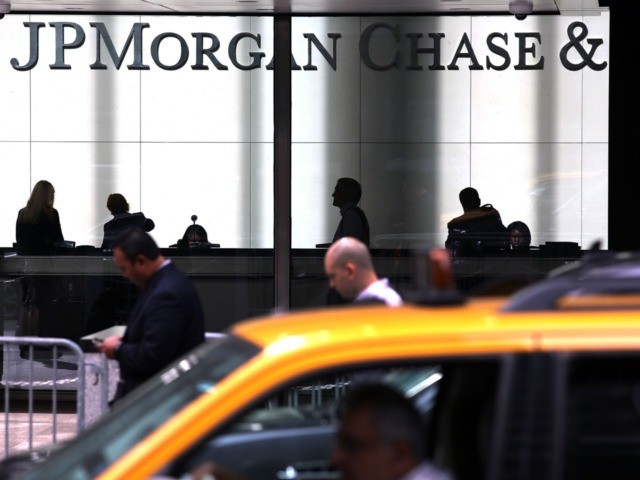Human life ‘as we know it’ is threatened by climate change and there may be ‘catastrophic outcomes’ unless urgent action is taken, two house economists at JP Morgan have warned in an explosive report ‘Risky Business – the Climate and the Macroeconomy’.
The report’s authors, David Mackie and Jessica Murray, warn that ‘climate change would not only impact GDP and welfare directly but would also have indirect effects via morbidity, mortality, famine, water stress, conflict, and migration.’
“We cannot rule out catastrophic outcomes where human life as we know it is threatened”, they add darkly, urging the immediate introduction of a global carbon tax to avert potential disaster.
Then again, they say, covering their bets, it may do none of those things because climate change is very unpredictable.
Their report has been greeted with undisguised rapture by the leftist media – including the BBC and the Guardian – delighted to have all its prejudices confirmed by an apparently rigorous study produced by a bank which it has previously criticised because of its investments in fossil fuels.
Wiser heads, however, recognise that the report is yet another climatological nothingburger cobbled together from the usual, compromised, dubious alarmist studies by a pair of economists with no special knowledge to bring to the party.
The report is not merely wrong but culpably misleading – the kind of false prospectus which would normally get any financial organisation promoting it into heaps of legal trouble.
Where it particularly falls down is in its reliance on RCP8.5. This is the so-called ‘business as usual’ (BAU) scenario which climate alarmists have for years being using on their computer models to predict potentially catastrophic temperature rises of the kind mentioned in the JP Morgan report.
The problem with RCP8.5 is that as Judith Curry, Roger Pielke Jr and others have pointed out, there is no real world evidence to support its hysterical predictions. On the contrary, as time goes by, the doomsday predictions of the RCP8.5 models look like a risible fantasy of no scientific value whatsoever.
As Jaime Jessop writes:
In the absence also of any observably catastrophic global rise in temperature throughout the 21st century (which not even ‘pause-busting’ adjustments to temperature data could conjure up), alarmists have turned to inventing imminent future catastrophes via the invocation of highly speculative ‘tipping points’ which supposedly will be ‘triggered’ at imaginary and entirely ad hoc global warming thresholds (1.5C, 2C, 3C etc. relative to pre-industrial baseline). They have also increasingly employed the highly unrealistic ‘business as usual’ scenario RCP8.5 to supercharge their global warming projections in order to manufacture climate alarmist narratives in the media, a strategy which only in the last couple of months has started to be seriously questioned. Roger Pielke Jr has recently been at the vanguard of the movement to expose the misuse of this nightmarishly unrealistic scenario as ‘business as usual’.
Apart from being alarmist propaganda bilge, the report’s other most dishonest feature is the way that it is being spun as something uncharacteristic of the financial industry.
In fact, the financial sector has long since capitulated to climate alarmism, not least because its dodgier operators – see Al Gore as an early example of this – have recognised the green scam as a route to easy profit.
It is, in fact, probably the single most alarming thing about the great global warming con: that big money is now so heavily involved in promoting it that it may be impossible for honest science or economic and political integrity to win the battle against all the mendacious and cynical vested interests seeking to profit from it (at the expense, of course, of all the little people).
This is what Terence Corcoran warns of here:
New plans to overthrow market-driven investment systems are a constant feature of today’s global financial scene. The recent appointment of Bank of England Governor Mark Carney as the UN’s special envoy for climate action and finance signals a renewed international effort to turn the world’s energy investors into pawns of state climate activists and agitators for market-distorting policies.
The movement to subvert markets, however, is much bigger than Carney. It is now accepted dogma globally that the financial markets are unreliable, twisted by greed and even corrupt. In Carney’s words, markets are based on “selective information, spin, misdirection.” That’s a mild criticism compared with the views of others. “Capitalism as we know it is dead,” said Salesforce chief Marc Benioff, one of many business leaders who have joined the anti-corporate left in claiming the financial and capital markets are destroying the planet.
In short, there is nothing surprising about JP Morgan throwing its weight behind the $1.5 trillion plus climate industrial complex because this is what all the world’s crony capitalists and rent-seekers are doing right now, so why should JP Morgan miss out on the party?
But the report needs to be taken with a very large pinch of salt. And if there’s anyone who doubts this, I’ve got an amazing deal just for you: a huge bridge, going cheap; and my vast and potentially hugely profitable portfolio of Enron and Solyndra shares.

COMMENTS
Please let us know if you're having issues with commenting.